Finance Minister Arun Jaitley may have tried to transfer money from the rich to the poor through higher levies and increased minimum support prices to mend India’s economic disparity.
At least that’s what Neelkanth Mishra, India equity strategist at Credit Suisse, thinks would’ve been the government’s thought process while drafting Budget 2018 in the so called “two-speed economy” environment.
The high-frequency indicators reflective of consumption at the top 20-30 percent of the economy, like airline traffic, car sales, mutual fund inflows and five-star hotel occupancies, are all “super strong”, Mishra told BloombergQuint in an interview. On the other hand, indicators of broad-based consumption like cement volumes and staples volumes are not doing well, he said.
“In this environment, if you were drafting policies and thinking what to do, you have to somehow transfer from the rich to the poor.”Neelkanth Mishra, India Equity Strategist, Credit Suisse
Allocation of Funds in the Budget
Jaitley in Budget 2018 hiked cess on income tax, increased customs duties on at least 45 items, and brought back a 10 percent tax on long-term equity gains. He also increased the support price for the kharif (monsoon) season to 1.5 times the crop’s cost.
These are just indirect ways of routing money to those in the lower income bracket, as opposed to direct taxes, where you “you tax the rich and give it to the poor”, according to Mishra. Given that half the country is a net producer of food, and the other half a net consumer, increasing food prices is a transfer of money, Mishra said.
That’s not going to be a walk in the park as allocating spends is difficult. “If you give me a large amount of money, it will be very hard to spend it. The same goes for the government. It is very tough to decide where to increase the spending.”
“The pipes don’t exist. There is water on top, and you have to get it down to the bottom. Other than just raising NREGA (rural jobs guarantee scheme) wages, or just putting money in people’s bank accounts, it is very hard to spend large amounts of money.”Neelkanth Mishra, India Equity Strategist, Credit Suisse
Mishra said there was a lot in the budget speech that stated the government's intent to equalise distribution of gains and boost the farm economy, especially “some very exciting” agricultural policies. That won't happen anytime soon, because India is “in a period of structural surpluses” of food. “In an environment of oversupply, even if the government wants to, it will be very hard to increase food prices. Unless you really ramp up food procurement infrastructure. They (government) are attempting that and from a signalling perspective, it is important for them to do that. But I doubt that it is going to be very effective,” he said.
On the lack of some big-bang reforms, Mishra said budgets are supposed to be “boring, mundane exercises”. People hype up something that is just a yearly arithmetic activity, he said. “And then we get disappointed when nothing major happens.”
The government has taken a stance “that if you can’t spend productively, then don’t spend”. The principle is something that they've adhered to in the past years and something that Mishra broadly agrees with.
(Published in arrangement with the BloombergQuint.)
